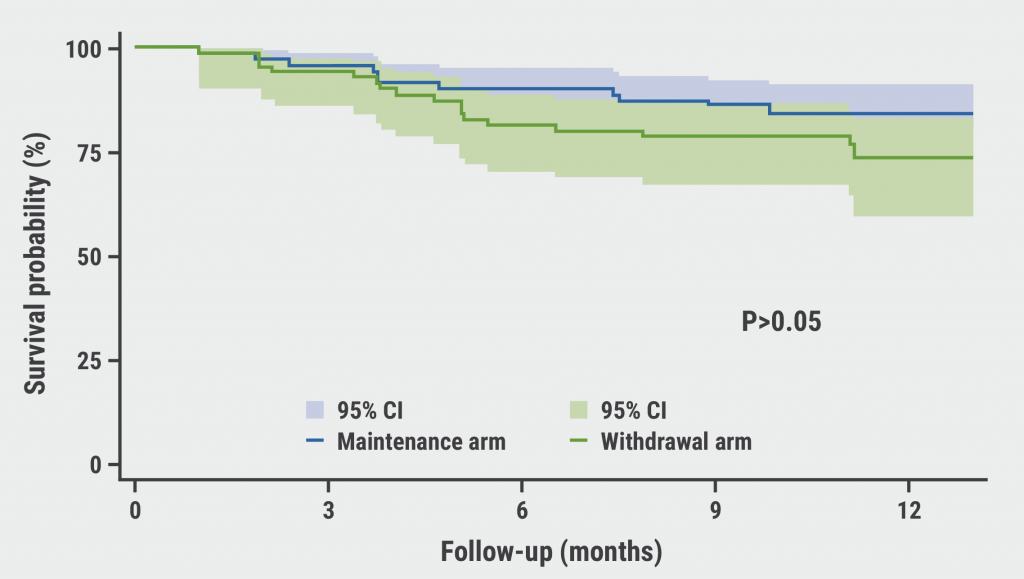Fatigue is common among patients with IBD, with 72% of the patients with active disease and 47% of the patients in remission reporting this symptom, explained Dr Marie Truyens (Ghent University Hospital, Belgium) [1]. Since tryptophan has been associated with fatigue in IBD, a multicentre, double-blind, cross-over, randomised-controlled trial (NCT03574948) was conducted to assess the efficacy of 5-hydroxytryptophan supplementation in fatigued patients with inactive IBD. The participants were randomised to 5- hydroxytryptophan first, 100 mg twice daily (n=82), or placebo first (n=84) for 8 weeks. Subsequently, the participants switched treatment groups. The primary endpoint was the proportion of participants with ≥20% reduction on the Visual Analogue Scale for Fatigue (fatigue-VAS).
After 16 weeks, approximately 35% of the 166 participants in either treatment group showed a ≥20% reduction on the fatigue-VAS. Since no significant difference was reported between the treatment groups (P=0.830), the primary endpoint was not met. In addition, similar reductions in depression, anxiety, and stress were reported for participants receiving placebo and participants receiving 5-hydroxytryptophan. Next, increases in 5-hydroxytryptophan and serotonin levels were observed, but these were not related to a reduction in fatigue.
Dr Truyens argued that the reduction in fatigue that was observed among placebo receivers may be associated with the extra attention that was given to this symptom. “Fatigue is often overlooked in patients with IBD. Additional clinical support and increased patient awareness may have resulted in a reduction in fatigue in this study population.”
- Truyens M, et al. A randomized placebo controlled clinical trial with 5-hydroxytryptophan in patients with quiescent Inflammatory Bowel Disease and fatigue (Trp-IBD). OP28, ECCO 2022, 16–19 February.
Copyright ©2022 Medicom Medical Publishers
Posted on
Previous Article
« Anti-TNFs versus vedolizumab and ustekinumab in Crohn’s disease Next Article
VEDOKIDS: Vedolizumab seems effective in paediatric IBD »
« Anti-TNFs versus vedolizumab and ustekinumab in Crohn’s disease Next Article
VEDOKIDS: Vedolizumab seems effective in paediatric IBD »
Table of Contents: ECCO 2022
Featured articles
Upadacitinib maintenance therapy delivers sustained improvements in active ulcerative colitis
Novel Treatment Modalities
Guselkumab shows encouraging safety and efficacy in ulcerative colitis
Guselkumab maintenance therapy achieved high efficacy rates in Crohn’s disease
Mirikizumab efficacious for active ulcerative colitis
Risankizumab more efficacious in colonic than in ileal Crohn’s disease
Guselkumab plus golimumab promising combination for ulcerative colitis
Combined endpoint may support personalised medicine in ulcerative colitis
Filgotinib seems promising for perianal fistulising Crohn’s disease
Upadacitinib maintenance therapy delivers sustained improvements in active ulcerative colitis
Upadacitinib counters extraintestinal manifestations in ulcerative colitis
Deucravacitinib does not meet primary endpoint for ulcerative colitis
Head-to-Head Comparisons
Anti-TNFs versus vedolizumab and ustekinumab in Crohn’s disease
Upadacitinib appears to be an efficacious therapy for moderately-to-severely ulcerative colitis
Subcutaneous infliximab versus subcutaneous vedolizumab in IBD
Vedolizumab outperforms anti-TNF in biologic-naïve ulcerative colitis
Short-Term and Long-Term Treatment Results
Ozanimod treatment shows maintained response in ulcerative colitis
Stopping infliximab but not antimetabolites leads to more relapses in Crohn’s disease
Vedolizumab first approved therapy for chronic pouchitis
VEDOKIDS: Vedolizumab seems effective in paediatric IBD
Primary endpoint of 5-hydroxytryptophan for fatigue in IBD not met
Specific Therapeutic Strategies
Positive outcomes with therapeutic drug monitoring during infliximab maintenance therapy
Segmental colectomy beneficial over total colectomy in Chrohn’s disease
Modified 2-stage ileal pouch-anal anastomosis versus 3-stage alternative
Similar results for different corticosteroid tapering protocols in UC
Miscellaneous Topics
Lessons from the COVID-19 pandemic for IBD management
AI model distinguishes between histologic activity and remission in ulcerative colitis
Multi-Omic and dietary analysis of Crohn’s disease identifies pathogenetic factors
Novel classification system for perianal fistulising Crohn’s disease
Vaccination tool associated with improved vaccination coverage in IBD
Comparable safety profiles of biological therapies in elderly patients with IBD
Early biologic therapy induces larger effect than delayed treatment in Crohn’s disease
RESTORE-UC: No better outcomes with FMT superdonors than with autologous stools
Related Articles
May 28, 2018
Malignancies occur infrequently with tofacitinib

© 2024 Medicom Medical Publishers. All rights reserved. Terms and Conditions | Privacy Policy
HEAD OFFICE
Laarderhoogtweg 25
1101 EB Amsterdam
The Netherlands
T: +31 85 4012 560
E: publishers@medicom-publishers.com

